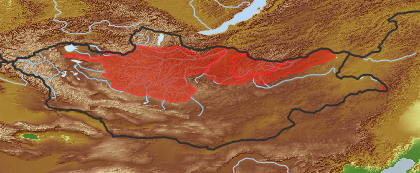| Class: | angiosperms |
| Order: | Liliales |
| Family: | Trilliaceae |
| Genus: | Paris |
| open map in a new window |  |
| species: 2 |
| Habit (i)general appearance of a plant | |
| Parasite status: (i)Is the plant a half- or full parasite? | no parasite/saprophyte (i)Plant fully autonomous, leaves with chlorophyll
example: Most plants, Ranunculus  inherited by family Trilliaceae: no parasite/saprophyte inherited by family Trilliaceae: no parasite/saprophyte
|
| Leaf (i)expanded, usually photosynthetic organ of a plant (including phylloclades) | |
| Leaf development: (i)Structure and development of leaves. | flattened blade (i)Cross-section of lamina flat, plain  inherited by family Trilliaceae: flattened blade inherited by family Trilliaceae: flattened blade
common leaf (i)Green, often divided in blade and petiole
example: Cotoneaster  inherited by family Trilliaceae: common leaf inherited by family Trilliaceae: common leaf
|
| Flower (i)reproductive portion of the plant, consisting of sepals, petals, stamens, and pistils | |
| Flower appearance and pollination: (i)General appearance of the flower. | attractive, animal-pollinated (i)attractive and coloured flowers, mostly large, attracting surely animals
example: Trollius, Rosa, Chamaerhodos  inherited by family Trilliaceae: attractive, animal-pollinated inherited by family Trilliaceae: attractive, animal-pollinated
|
| Perianth arrangement: (i)Attention: in some plants, flowers may be dimorphic in different ways (dioecious or gynodioecious). If flowers vary, record the characters of the most showy flowers. | simple, similar (i)Only one type of perianth leaves (tepals)
example: Tulipa   inherited by family Trilliaceae: simple, similar inherited by family Trilliaceae: simple, similar
double, different (i)Two types of perianth leaves, differently coloured (sepals: outer periant leaves, usually greenish, and petals: inner perianth leaves, usually coloured)
example: Parnassia    inherited by family Trilliaceae: double, different inherited by family Trilliaceae: double, different
|
| Spur: (i)A hollow, slender, sac-like appendage of the perianth leaves, storing nectar. | no spur (i)Flower without appendage
example: Peganum  inherited by family Trilliaceae: no spur inherited by family Trilliaceae: no spur
|
| Root / shoot below ground (i)plant part below ground (in most cases), including below ground shoots, without leaves | |
| Root type: (i)Organisation of the roots. | homorhizous (i)Many equal roots
example: Monocotyledonae  inherited by order Liliales: homorhizous inherited by order Liliales: homorhizous
|